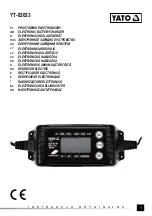
GA6012 12V Lead-Acid Battery Charger
User’s Manual
August 2019 First Version
CAUTION
1.
SAVE THIS INSTRUCTIONS
- This manual contains important safety and
operating instructions for the
GA6012
batterycharger. Please read
the caution of batteries or devices you want to charge firstly!
2. When charging, batteries can emit explosive gases, therefore it is
essential to prevent flames and sparks. The charger is designed for
charging lead-acid batteries from 4 to 100Ah. Do not use for anyother purpose.
3. Good ventilation when charging.
4.
Use of an attachment not recommended or sold by us may result in a risk of fire,
electric shock or serious injury to persons.
5. To reduce risk ofdamage to electric plug and cord, pull by the plug
rather than by the cord when disconnecting charger.
6. An extension cord should not be used unless absolutely necessary.
Use of an improper extension cord could result in a risk of fire and
electric shock. If extension cord must be used, make sure that:
a)
Pins on plug of extension cord are the same number, size and shape as
those of plug on charger;
b) Extension cord is properly wired and in good electrical condition;
c) Wire size is large enough for ac ampere rating as specified in
“technical data”.
7.
Do not operate charger with a damaged cord or plug, return the
charger to the place where purchased.
8. Never operate the charger if it has received a sharp blow, been dropped or
otherwise damaged in anyway; take it to a qualified serviceman.
9.
Do not disassemble the charger; take it to a qualified serviceman when
service or repair is required. Incorrect reassembly may result in a risk
of electricalshockor fire.
10.
To reduce risk of electric shock, unplug charger from AC outlet before
attempting any maintenance or cleaning. Turning off controls will
reduce the risk.




















